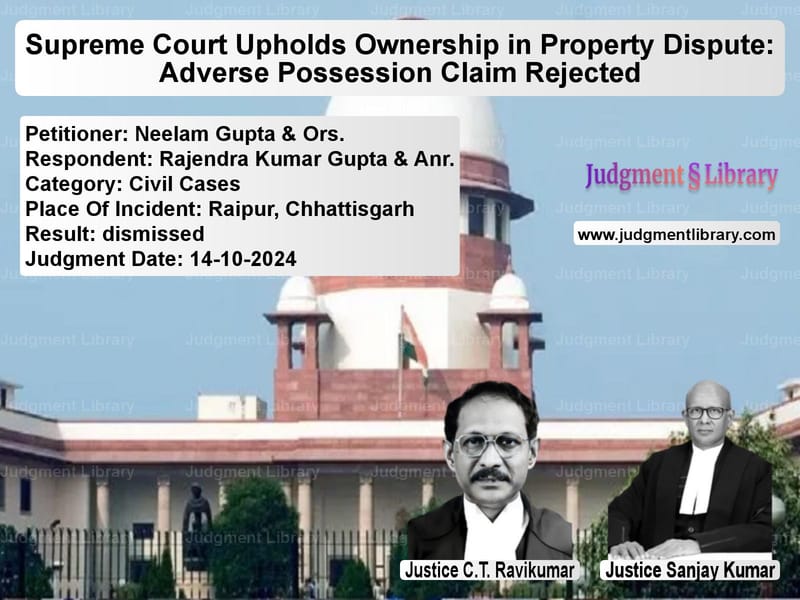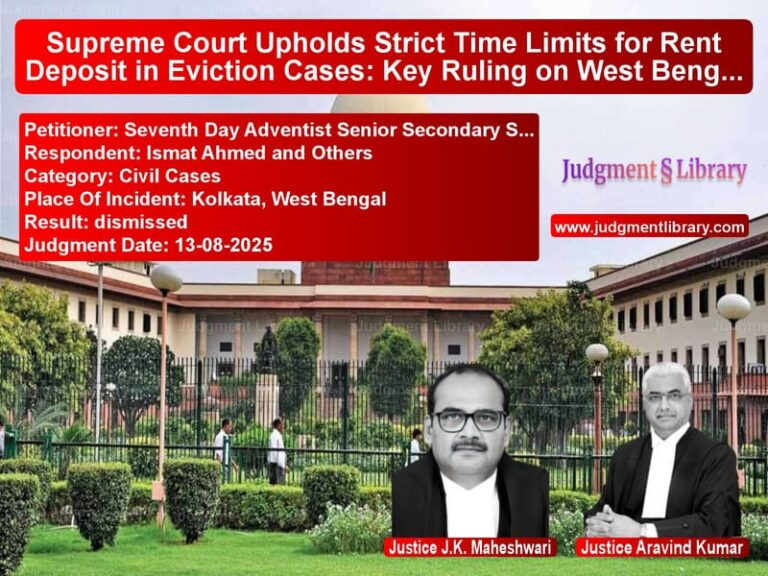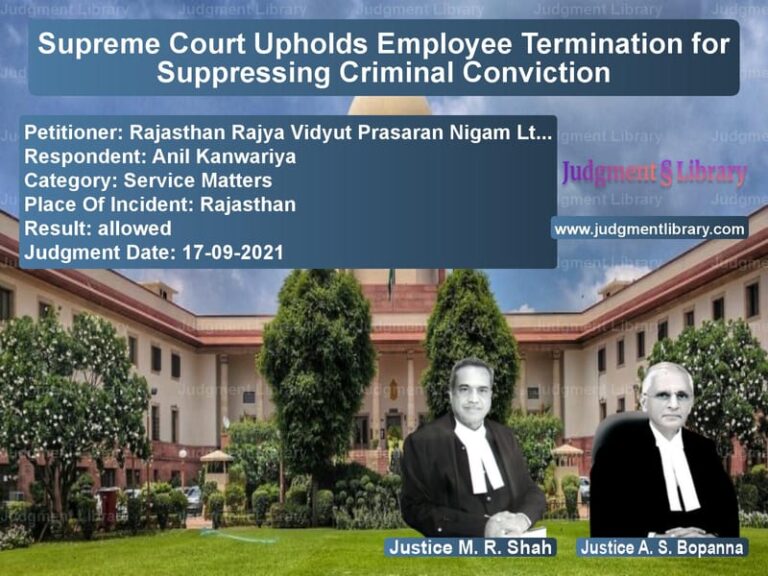Supreme Court Upholds Ownership in Property Dispute: Adverse Possession Claim Rejected
The Supreme Court of India, in Neelam Gupta & Ors. v. Rajendra Kumar Gupta & Anr., delivered a landmark judgment on October 14, 2024, affirming the rightful ownership of the plaintiff over disputed land and rejecting the defendants’ claim of adverse possession. The ruling overturned the concurrent findings of the lower courts, ensuring that the rightful owner is reinstated in possession.
Background of the Case
The dispute centered around land measuring 7.60 acres in Khasra No. 867/1 in Mowa village, Raipur. The plaintiff, Rajendra Kumar Gupta, claimed ownership based on a registered sale deed dated June 4, 1968, executed in his favor by Sitaram Gupta, a cousin common to both parties. However, the defendants, Ashok Kumar Gupta and Rakesh Kumar Gupta, contended that the property was part of a joint Hindu family estate and that they had been in possession since 1968, acquiring title by adverse possession.
Chronology of Events
- June 4, 1968: Plaintiff purchased the disputed land through a registered sale deed.
- July 1983: Plaintiff was allegedly dispossessed by the defendants.
- December 24, 1986: Plaintiff filed a suit seeking possession and damages.
- April 4, 1990: Defendants filed their written statement claiming joint family ownership and adverse possession.
- July 11, 2014: The Chhattisgarh High Court reversed the lower courts’ decision and ruled in favor of the plaintiff.
- October 14, 2024: Supreme Court upheld the High Court’s ruling, dismissing the appeals filed by the defendants.
Petitioner’s Arguments (Neelam Gupta & Ors.)
The defendants, represented by legal counsel, argued:
- The property was part of a joint Hindu family estate, and Sitaram Gupta had no independent right to transfer it.
- They had been in continuous, open, and hostile possession since 1968, acquiring title by adverse possession.
- The suit was barred by limitation as the plaintiff had failed to assert his rights within 12 years of dispossession.
Respondent’s Arguments (Rajendra Kumar Gupta)
The plaintiff contended:
- He had legally purchased the land and had been recorded as its Bhumiswami (title holder) in revenue records.
- The defendants’ possession was merely permissive, as they initially occupied the land as Adhiyadar (tenants) in 1973-74.
- The defendants had previously filed an application before the revenue authorities in 1981 seeking tenancy rights, contradicting their claim of ownership by adverse possession.
Supreme Court’s Analysis and Judgment
Ownership of the Plaintiff Affirmed
The Supreme Court found that the plaintiff had a clear title:
“The plaintiff acquired valid ownership through a registered sale deed, and the defendants’ attempt to claim adverse possession contradicts their own admission before revenue authorities.”
Adverse Possession Rejected
The Court relied on Article 65 of the Limitation Act, 1963, and ruled:
“The burden to prove adverse possession lies on the defendants, who failed to establish continuous, open, and hostile possession for 12 years.”
Contradictory Statements by Defendants
The Court noted:
“In 1981, the defendants filed an application claiming tenancy rights. A person claiming tenancy cannot simultaneously claim ownership by adverse possession.”
Final Judgment
The Supreme Court ruled:
“The High Court’s judgment is affirmed. The plaintiff is entitled to possession of the disputed land. The defendants shall vacate the premises within 60 days.”
Key Takeaways from the Judgment
- Registered Sale Deed Establishes Ownership: A legally executed sale deed holds primary evidentiary value.
- Adverse Possession Requires Strong Proof: Mere long-term possession is insufficient without proving hostility to the owner’s title.
- Revenue Records Strengthen Ownership Claims: Official land records and entries can substantiate legal ownership.
Impact of the Judgment
- Protects Lawful Landowners: Strengthens the rights of registered title holders against illegal possession claims.
- Clarifies Adverse Possession Law: Emphasizes that adverse possession must be proven through hostile, exclusive, and uninterrupted possession.
- Sets a Precedent for Property Disputes: Ensures that revenue records and registered transactions are given due legal weight.
Conclusion
The Supreme Court’s decision in Neelam Gupta v. Rajendra Kumar Gupta is a landmark ruling reinforcing property rights. The judgment clarifies the distinction between legal ownership and adverse possession, ensuring that landowners cannot be unlawfully deprived of their property through vague and contradictory claims. This case will serve as a guiding precedent for future land disputes in India.
Petitioner Name: Neelam Gupta & Ors..Respondent Name: Rajendra Kumar Gupta & Anr..Judgment By: Justice C.T. Ravikumar, Justice Sanjay Kumar.Place Of Incident: Raipur, Chhattisgarh.Judgment Date: 14-10-2024.
Don’t miss out on the full details! Download the complete judgment in PDF format below and gain valuable insights instantly!
Download Judgment: neelam-gupta-&-ors.-vs-rajendra-kumar-gupta-supreme-court-of-india-judgment-dated-14-10-2024.pdf
Directly Download Judgment: Directly download this Judgment
See all petitions in Property Disputes
See all petitions in Landlord-Tenant Disputes
See all petitions in Specific Performance
See all petitions in Damages and Compensation
See all petitions in Succession and Wills
See all petitions in Judgment by C.T. Ravikumar
See all petitions in Judgment by Sanjay Kumar
See all petitions in dismissed
See all petitions in supreme court of India judgments October 2024
See all petitions in 2024 judgments
See all posts in Civil Cases Category
See all allowed petitions in Civil Cases Category
See all Dismissed petitions in Civil Cases Category
See all partially allowed petitions in Civil Cases Category







